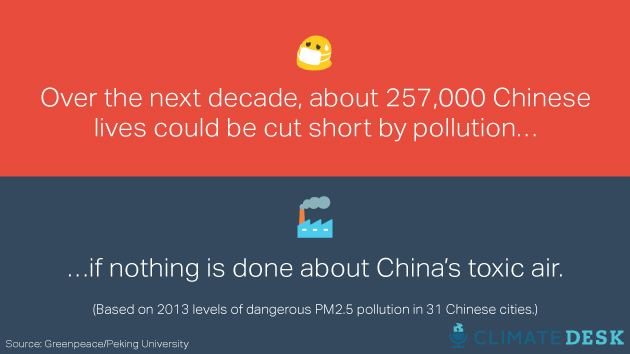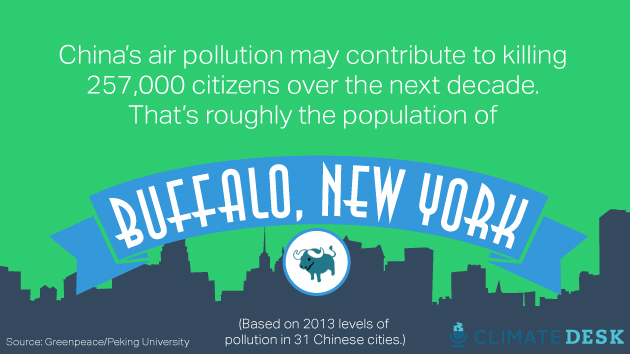
If nothing is done to slash the levels of toxic smog in China’s air, some 257,000 Chinese people could die over the next decade from pollution-related diseases, according to a new study released this week by Peking University and Greenpeace. That really is a lot of people; it’s roughly equal to the population of Orlando, Florida, or Buffalo, New York.

The researchers analyzed the 2013 levels of what’s known as PM2.5 pollutants—tiny airborne particles billowing from China’s coal production and industry. They projected the number of “premature deaths”—from diseases like heart disease and lung cancer—that could occur over the next 10 years if 2013’s level of pollution persists over the long term.
At the top of the list of China’s most polluted cities, toxic air in the industrial hub of Shijiazhuang could be responsible for as many as 137 premature deaths per 100,000 people. The team found the average across the country’s 31 populous provincial capitals was staggering:

The report comes amid renewed attention on China’s smog crisis. Another Greenpeace study released earlier this month revealed that 90 percent of Chinese cities that report their air pollution levels are failing to meet China’s own national standards, despite the government’s self-declared “war on pollution,” which includes measures to curtail coal use in big cities like Beijing, and to limit heavy industries.
If China met those standards, says Greenpeace in this latest report, nearly half of the premature deaths could be avoided.
The research is also notable because it was conducted jointly by China’s best known and most prestigious university, Peking University (known locally as Beida), and Greenpeace, the international environmental advocacy group that has had a long and complicated relationship with China’s authoritarian officials. The study was widely reported by state-run media, in another sign China’s censors are loosening some restrictions around environmental reporting in the country in the face of intense public pressure for transparency.
The report adds to the growing amount of literature about the deadly impacts of the country’s smog. An article that appeared in the The Lancet last year said that air pollution caused 350,000 to 500,000 premature deaths a year. An earlier Lancet study reported that air pollution caused 1.2 million premature deaths in 2010 alone.













